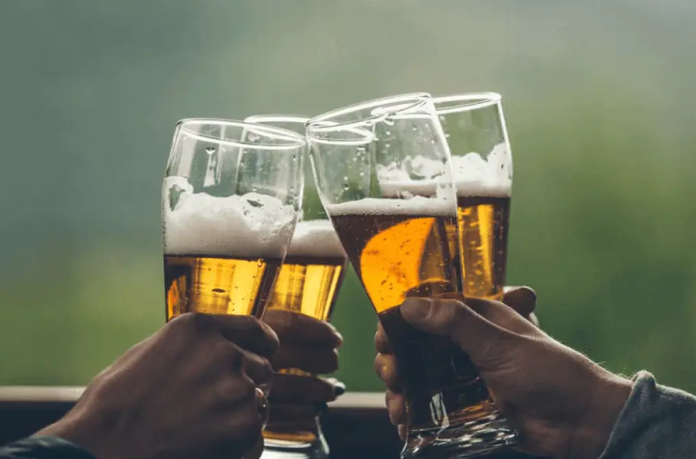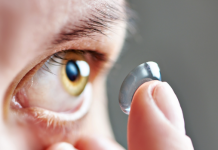According to the results of a recent study, even moderate alcohol consumption (one pint of beer or an average glass of wine per day) may begin to reduce brain capacity.
The study, published in the journal Nature on Friday, found that persons who regularly drank two alcohol units (equal to a pint of beer or a 6-ounce glass of wine) had brains that seemed two years older than those who just drank a half of a beer (one unit).
People of that age who reported drinking three alcohol units per day exhibited white and gray matter decreases similar to what would be seen in someone 3.5 years older.
Ten milliliters, or about 8 grams, of pure alcohol constitutes one alcohol unit. That’s why a shot of liquor (which is 25 milliliters) is counted as one unit, a 16-ounce can of beer or cider is two units, and a 6-ounce glass of wine (175 milliliters) is also counted as two units.
The study found that the brains of previously nondrinking individuals showed the aging effects of drinking alcohol at a rate of one alcohol unit per day.
A person’s brain ages by more than 10 years for every four alcohol units consumed daily.
“It’s not linear. It gets worse the more you drink,” first author Remi Daviet, an assistant professor of marketing in the Wisconsin School of Business at the University of Wisconsin-Madison, said in a statement.
“A problem in this study is that they only have information on people’s drinking habits for the one year prior to the (brain) imaging,” said alcohol researcher Emmanuela Gakidou, a professor of health metrics sciences at the University of Washington.
“I think this is a major limitation of the study as it’s likely that the cumulative consumption of alcohol throughout one’s lifetime is associated with the brain, not just the level of consumption right before the images were taken,” she added.
“The relationship between alcohol and health is complex, and our understanding of that relationship is evolving over time. Based on this study, I would not really draw any definitive conclusions, but I would say that the authors have identified areas for further research.”
Benefits of alcohol?
Traditional medical wisdom held that drinking alcohol in moderation might have positive effects on health, particularly for the cardiovascular system and the brain. Multiple studies have shown that alcohol intake of any amount is detrimental to health, and the World Heart Federation has just released a policy brief stating that “no level of alcohol consumption is safe for health.”
“Small amounts of alcohol are associated with health benefits for some conditions, such as ischemic heart disease and diabetes, but harmful for others, such as road traffic accidents and breast cancer,” Gakidou said, adding there are others, such as a stroke, where the outcome isn’t clear.
“There isn’t really a simple answer for a given individual,” she said. “Based on what we do know at this time, whether small amounts of alcohol are beneficial or harmful for an individual depends on that person’s health status and their risk profile. … Are they more prone to heart disease or cancer?”
Brain scans and large study size
More than 500,000 British middle-aged persons’ genetic and health data were studied for this paper. The UK Biobank study included more than 36,000 participants.
Participants got MRI brain scans and reported how many beers they had consumed weekly during the preceding year. The scans were compared to pictures of normal aging brains, and the researchers accounted for factors including age, sex, smoking, socioeconomic position, genetic heritage, and head size.
“The fact that we have such a large sample size allows us to find subtle patterns, even between drinking the equivalent of half a beer and one beer a day,” coauthor Gideon Nave, an assistant professor of marketing at the Wharton School of the University of Pennsylvania, said in a statement.
“Having this dataset is like having a microscope or a telescope with a more powerful lens,” Nave said. “You get a better resolution and start seeing patterns and associations you couldn’t before.”
He explained that is why this study was able to find a more distinct pattern of association between drinking and brain volume than past studies. However, he added, the results are just that – an association – as the study could not prove cause and effect.
“Our study is by far the largest investigation of the topic,” Nave said. “It uses a general population sample, and it controls for more confounds than before. As such, it provides overwhelmingly more evidence than any previous investigations and gets us closer to settling the debate.”
However, the study left a number of questions unanswered, such as a person’s cognitive engagement, Gakidou said.
“I believe that there is sufficient evidence that suggests that brain function decays faster among those that are not engaged in intellectually stimulating activities, either through work or hobbies,” she said.
“My main criticism is that the authors are overinterpreting the findings of their study and drawing conclusions that are not necessarily supported by what is presented in the paper. I do not see a significant trend in their graphs, and so I’m not convinced by the conclusions.”










